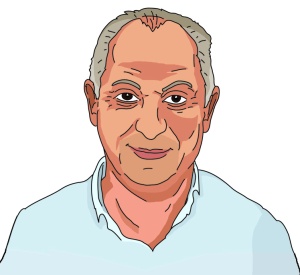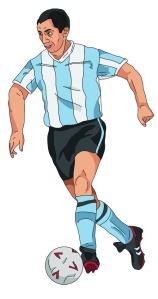Filed under: Dave Clarke, Soccer Coaching, Soccer Fitness, Soccer News, Soccer Refereeing, Soccer Skills, Soccer Team Management, Soccer Training | Tags: alf, Ardiles, coerver, development, Football, galustian, japan, maradona, messi, ossie, Soccer, World Cup, youth
 As a young player Ossie Ardiles was smaller than the other boys around him so he wouldn’t pass the ball much – he would just dribble and dribble and dribble. Much like Maradona and Lionel Messi. His brother called him Piton, the snake. In this exclusive interview Soccer Coach Weekly’s David Clarke spoke to him about youth soccer, Argentina legends and Japanese success
As a young player Ossie Ardiles was smaller than the other boys around him so he wouldn’t pass the ball much – he would just dribble and dribble and dribble. Much like Maradona and Lionel Messi. His brother called him Piton, the snake. In this exclusive interview Soccer Coach Weekly’s David Clarke spoke to him about youth soccer, Argentina legends and Japanese success

Most recently Ossie Ardiles was the coach of Machida Zelvia in the second tier of the Japanese J-League, but a 23-year coaching career has taken the Argentinian World Cup winner around the world. As player-manager he introduced a flamboyant style of football to Swindon Town in his first coaching job, achieving promotion to the top flight in 1990 (only for the FA to strip the club of this honour for off-the-field irregularities).
Three years later he took West Brom to Division One and later made headlines in the Premier League with a cavalier Spurs side notable for fielding five forwards. After relocating to Japan he was named J-League Manager Of The Year in 1998 for his work with Shimizu S-Pulse. He won the first stage of the J-League with Yokohama F Marinos in 2000 and the Emperor’s Cup with Tokyo Verdy five years later.
He has also enjoyed spells managing clubs in Mexico, Argentina, Paraguay, Croatia, Israel and Saudi Arabia, giving him a truly global view of the game – but wherever he has coached, he has always brought a certain Ossie style to the job.
DAVID Having coached four clubs in England, is the Premier League the best in the world?
OSSIE“The Premier League is certainly the most watched and the richest – and it attracts the best players in the world because of these reasons. Yes, I would imagine it’s the best league in the world.”
 You have enjoyed several stints in Japan. What is it about the Japanese game that attracts you?
You have enjoyed several stints in Japan. What is it about the Japanese game that attracts you?
“The J-League started in 1993 and I came soon after. I think the J-League is and was the model of how professional football should be marketed for the fans. In Japan I have won the League and The Emperors Cup and I have been told that I also have more victories than any other foreign coach in the league’s history.”
Who have been the coaches that have impressed you the most in Japan?
“There have been some great coaches in Japan: the Brazilian legend Zico, Hans Ooft from Holland, and of course Arsene Wenger. Wenger to me was special – you knew his teams would play football, the beautiful game as Pelé called it. I know his time in Japan influenced him and like me he loved the culture. Since leaving Japan I am not surprised to see he stuck with all his beliefs about the way the game should be played and the way to behave civilly and with respect – the Japanese way.”
Japanese women are world champs and the men are champions of Asia. Why has their game been so successful?
“You need to understand the Japanese culture. Like every aspect of their lives, great attention and care is spent on detail, studying whatever they want to establish and then replicating and improving it. Football was no different. The professional league was marketed to perfection, so the fans supported the game. The Japanese also think long term so youth development was always a priority for the Japanese Football Association. The success of Japanese players and teams today is a result of their youth development programmes.”
As a long-standing champion of youth development and the education of coaches, what programmes have impressed you in Japan?
“In my 17 years here, the programme that has impressed me most, and the one that has dominated nationally, has been the Coerver programme. I remember in the early years they started with a few schools and today they have over 100 schools all over the country. I am a close friend with Alf Galustian, who is a co-founder of the programme and the driving force behind it, so I have always kept a close interest.”
 What is so special about the contribution of Alf Galustian and Coerver to football in Japan?
What is so special about the contribution of Alf Galustian and Coerver to football in Japan?
“Alf is without doubt a global pioneer in youth coaching. I am still amazed with the new drills, games and concepts he continually comes up with. His contribution to Japanese football development is without question. “Over these past 20 years he has influenced the way football is taught in Japan and the subsequent success of the game here. “Currently more than 17,000 young players go through the Coerver programme each week, and in the past 20 years over 300 players have gone into J-League clubs and some to the various national teams – that’s an amazing contribution to the game in Japan.”
After winning the 1978 World Cup, was it difficult to adjust to playing your football in England?
“It took me a while. In those days the long ball game – getting the ball into opposition’s third, often bypassing midfield – was strange to me. But at Spurs we had Glenn Hoddle, and Ricky Villa came with me too, so Spurs always tried to play passing football and that suited me.”
Would you say there is an Ossie Ardiles way of playing soccer?
“Yes. I have always believed in the passing game. My style is about possession but also always trying for the forward pass. I have always believed in attacking, as a player and as a manager – I have often been sacked for these beliefs but I will never change. Football is a technical game and that’s where its beauty is.”
 Ossie’s Verdict Maradona or Messi?
Ossie’s Verdict Maradona or Messi?
“It’s very close and they’re both fellow Argentinians. I think it would be Messi, but I have to qualify that. Maradona was the best player I played with by a mile. I have never seen such a skilled player. He could control the ball on any surface, in any space, and whatever the pressure he was put under. But Messi is playing in an era when there is improved knowledge in sports science about what you eat, drink, and how you prepare. Today the boots and the ball are superior. Today the fields are all unbelievable. So when people speak about comparisons between players like Maradona and Messi, all these factors should be taken into consideration.”
Ossie’s Coaching Career
1989–91: Swindon Town (England)
1991–92: Newcastle United (England)
1992–93: West Brom (England)
1993–94: Tottenham Hotspur (England)
1995: Guadalajara (Mexico)
1996–98: Shimizu S-Pulse (Japan)
1999: Dinamo Zagreb (Croatia)
2000–01: Yokohama F Marinos (Japan)
2001: Al-Ittihad (Saudi Arabia)
2002–03: Racing Club (Argentina)
2003–05: Tokyo Verdy (Japan)
2006–07: Beitar Jerusalem (Israel)
2007: Huracán (Argentina)
2008: Cerro Porteño (Paraguay)
2012: Machida Zelvia (Japan)


